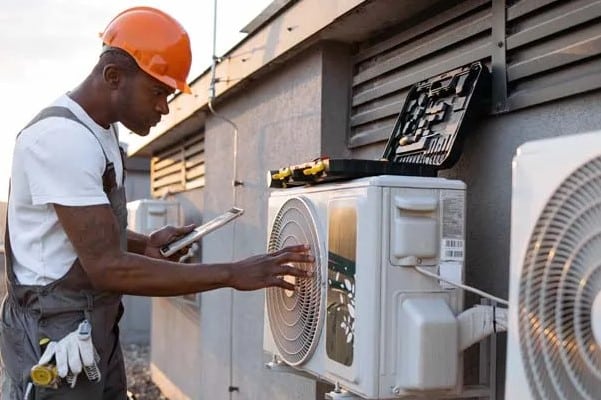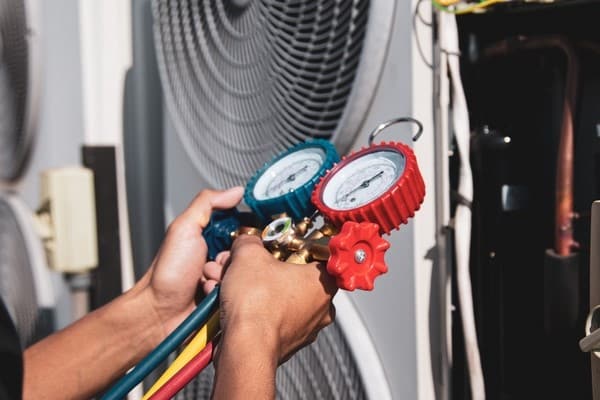When it comes to keeping your living space cool in the summer and warm in the chilly months, your HVAC unit is your biggest ally. Your heating and cooling system has a way of chugging along quietly, making it a bit too easy to forget the hard work it does—until something breaks.
But don’t stress because you don’t have to be a master home technician to keep your HVAC system functioning well. A few preventive tips can help extend its life, saving you money on energy bills, and preventing a catastrophic tear-your-hair-out failure. And remember: no experience is necessary.
Change Your Air Filters Regularly
Let’s start simple: change your air filter. Most heating and cooling systems should have their filter changed every 1 to 3 months, depending on usage and air quality. If you have pets, suffer an allergy flare-up, or live in a particularly dusty environment, you might need to change it monthly.
Why does this matter? A clean filter improves air flow, helps your system work efficiently, and keeps dust and allergens out of the air. Skipping this incredibly important step makes your unit work much harder, potentially causing your energy bill to shoot up and your HVAC system to short-circuit more rapidly.
Keep Vents Clean and Unblocked
This one’s straightforward but often overlooked. Check to ensure that air vents and registers in every room aren’t obstructed by furniture, rugs, or debris. Give each space a quick check to clear the way for flowing air. Are the vents looking a bit dusty? Quickly pass a vacuum over them or wipe with a damp cloth.
Less circulation means your room won’t be as cool/warm and your HVAC system has to work harder, meaning the motor will eventually experience wear and break. Translation: you’re not getting any airflow in the room, so the HVAC unit runs overtime trying to make it happen.
Check Your Thermostat Settings
How much energy do you lose just by overworking your thermostat? In the summer, consider setting your thermostat at 78°F when you’re in the house and a few degrees higher when you’re not. In the winter, 68 °F degrees is usually the sweet spot your thermostat should hover around.
If you haven’t already, think about getting a programmable or smart thermostat. Just set your schedule and control it from your phone. It will cut down on your energy bill without you even realizing it. Click here to learn how to program a thermostat.
Clear the Area Around Outdoor Units

Your HVAC’s outdoor unit needs room to breathe. However, because of its location outside the house, it starts accumulating leaves, dirt, grass clippings, and other debris, all of which can clog the system.
Take a few minutes once a month to trim bushes and tall grass, remove leaves and debris, and gently hose off dirt buildup. Create two or more feet of space around your unit. It’s the easiest way to save money because that way, you prevent heating that keeps the HVAC working all the time or shutting down completely.
Listen for Unusual Noises
If you hear your HVAC making loud popping, banging, clanking, or whistling sounds, that’s a sign that something needs fixing. Don’t ignore what you hear. These noises could mean a part is coming loose, the airflow is blocked, or the motor’s on its way out the door. The earlier you catch these problems, the less you’ll have to spend down the road in repairs or replacement.
Check Your Drain Lines
If your air conditioner cools your house, it also works to remove moisture in the air. That water flows through a drain line outside. But eventually, the drain gets blocked by algae or debris. This happens because that part of the system is usually overlooked. So, what do you do?
Find that drain line; it’s usually a small PVC pipe near your outdoor unit. Pour a cup of white vinegar or diluted bleach down the drain line every few months to keep it clear.
This should work to keep the air conditioner working in good condition. If the drain gets clogged, it can cause water damage to your home or shut off your system altogether. Plus, it’s hard to clear the hole if it becomes clogged. Spend five minutes cleaning it now, so you don’t spend all day on it later.
For clear steps to clean the drain line, check out this helpful resource: https://www.angi.com/
Clean the Blower Fan

It seems like something out of a science-fiction movie, but your HVAC has a blower fan that pushes conditioned air through the ducts and into your home. Over time, the blades of the blower collect dust and hamper efficiency.
Many blowers are accessible for cleaning through the indoor unit, so do it with a soft brush or cloth. If that makes you nervous, don’t worry about it. A proper cleaning should come with any tune-up with your technician.
Don’t Forget the Ductwork
Heating or cooling ducts aren’t something you usually think about, but you should. Dust and gunk can accumulate in the ductwork, blocking airflow and spreading allergens. Have your ducts inspected every few years, especially if your home is old, you’ve done recent renovations, or there’s a musty smell when the system runs. Have your ducts professionally cleaned to improve air quality. Plus, cleaning ducts boosts HVAC efficiency in the long run.
Monitor Energy Bills
This one is a little more obvious than the rest. Sometimes, you’ll know there’s an HVAC issue, not when you hear it, but when you see it in the form of an energy bill that spikes, even if your usage habits haven’t changed. Check your current bill against previous months or the same period last year. If the current cost seems out of line, contact a technician for a quick inspection.
Call in the Pros When You Need Backup
Not everything about HVAC maintenance can be DIY’d, and that’s perfectly okay. If you sense differing room temperatures, funky sounds when the system kicks on, or unexplained spikes in your energy bill, it’s time to call in the professionals. A trained HVAC technician can nip the issue in the bud before it escalates into a costly problem.
That is why choosing professionals from a reliable company is crucial. In the grand scheme of things, this company can make or mar how the system works, costing or saving you money and stress. From regular maintenance inspections, to 24-hour emergency service, and everything in between, they can guarantee everything is working safely and running at maximum efficiency.
A strong partnership with a knowledgeable HVAC company is one of the best ways to get some peace of mind. This is especially necessary in the chilly depths of winter or the dog days of summer.
Wrapping Up
You don’t have to be an HVAC technician to take care of your system. A little attention, some occasional checks, and a service visit every so often, and your system will be good as new. From changing filters to calling in the professionals when you’re in over your head, staying on top of this must-know home basics will keep your home running smoothly and your wallet happy.
Considering it’s one of the hardest-working systems in your home, it only makes sense to take care of it. Treat it right, and it’ll keep the cold (and hot) sweat at bay for years.
